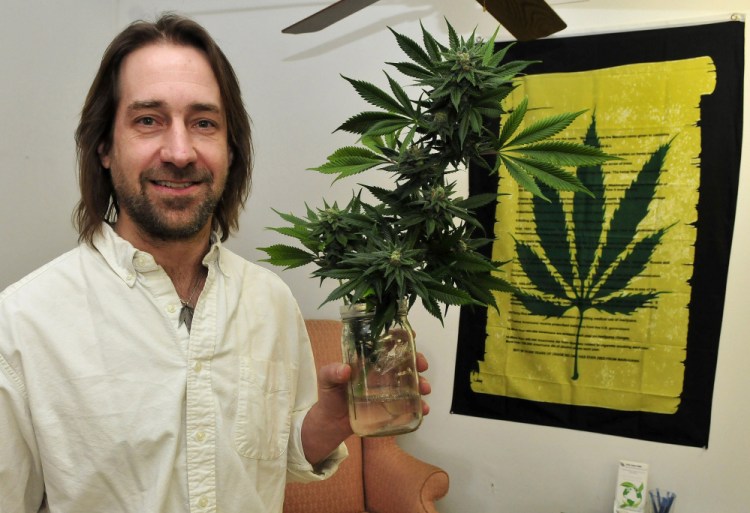Medical marijuana caregivers and patients will ask state regulators Tuesday to consider adding opiate addiction as a qualifying condition for medical marijuana.
Maine will be the first state to formally consider allowing medical marijuana to be used as treatment for addiction to opiates and other drugs derived from chemical synthesis, said Dawson Julia, a caregiver from Unity who submitted a petition to the Maine Department of Health and Human Services to request the public hearing.
Julia and other advocates say now is the time to consider using medical marijuana to combat the opiate epidemic that has fueled a sharp rise in overdose deaths from heroin, fentanyl and prescription drugs.
“We clearly have a major public health issue and we don’t currently have a good solution to it,” said Dr. Dustin Sulak, a Falmouth-based doctor and leading expert in Maine on medical marijuana. “Cannabis alone isn’t enough to completely solve this epidemic, but we need a treatment that can replace the opioids.”
But the idea of treating opiate addiction with marijuana, which the federal government still classifies as an illicit drug, is likely to meet opposition from the LePage administration, as well as from substance abuse providers and the medical community, because of scant evidence that the treatment would be effective.
Gordon Smith of the Maine Medical Association said he expects representatives of both that group and the Maine Association of Psychiatric Physicians will be at Tuesday’s hearing and will oppose the addition of addiction to the list of qualifying conditions on the grounds that there is no scientific basis for the assertion that marijuana is effective in treating addiction.
In 2014, 350,000 Mainers – or about one in four residents – were prescribed 80 million doses of opioid medication, according to DHHS. The heroin epidemic has fed a spike in drug overdoses, which claimed the lives of 272 Mainers last year, up from 208 in 2014 and 155 in 2011.
The number of medical marijuana patients has grown in recent years as patients look for alternatives to opioids, according to advocates. The state cannot provide an exact number of patients because it does not keep a registry, but doctors in 2015 printed more than 35,000 certificates required under state regulations to certify patients. That number could include duplicates and replacement certificates and is likely higher than the actual number of patients, according to DHHS. There are about 300 doctors across the state who certified patients in 2015.
The state’s medical marijuana law currently allows patients to become certified if they have one of about a dozen qualifying conditions, including chronic pain, post-traumatic stress disorder and cancer.
Sulak and Julia say researchers have found that opiate overdose deaths are 25 percent lower in states with medical marijuana laws.
Sulak says cannabinoids prevent people from building up a tolerance to opioids, so they can take fewer strong painkillers. Marijuana is also an “excellent” treatment for opioid withdrawal, which causes symptoms like nausea, diarrhea, muscle spasms, insomnia and anxiety, he said.
“Those are some of the best things to use cannabis for clinically,” he said. “In our practices, we probably see at least one person every day – and often more – who has replaced opioids with cannabis. They say they have their life back. Their function improves and their quality of life improves.”
A 2012 study by Thomas Jefferson University concluded that “evidence is accumulating that cannibinoids may be useful medicine.” Of the 91 patients seeking treatment for opiate addiction involved in the study, the patients given cannabis as treatment had the least amount of withdrawal symptoms, according to researchers.
Julia said he is a caregiver for a patient in her 60s who was able to reduce, and eventually stop, using opioids after she started using medical marijuana pills. Once the patient stopped using opiates, the marijuana helped ease her withdrawal symptoms, Julia said. The woman has now been off her opiates for four months.
Currently, patients looking to get off their opiates may be prescribed methadone or suboxone, which are commonly used to treat opiate addiction.
“It’s like moving a whiskey alcoholic down to wine, then to beer,” Julia said. “Really, they’re still addicted.”
There have been some small studies of the effectiveness of marijuana to treat addiction, but there is not a large body of medical evidence for doctors to look to, according to experts. Because marijuana is a Schedule I drug, there has been little research in the United States on the effectiveness of marijuana as medicine.
The Obama administration is considering whether to alter federal regulations that classify marijuana as a Schedule I drug, a category that includes much more potent drugs, such as heroin. The classification makes it more difficult to obtain funding and approval for medical research. Reclassifying marijuana as a less dangerous drug should help open the floodgates for research, experts say.
The public hearing is scheduled from 10 a.m. to 3 p.m. Tuesday at the Division of Licensing and Regulatory Services at 41 Anthony Ave. in Augusta. Written comments will be accepted through May 3.
DHHS Commissioner Mary Mayhew has 180 days to approve or deny the petition. Under state law, she can consider public testimony and written comments, as well as consult with physicians and seek additional research at her discretion.
Staff Writer Joe Lawlor contributed to this report.
Send questions/comments to the editors.




Comments are no longer available on this story